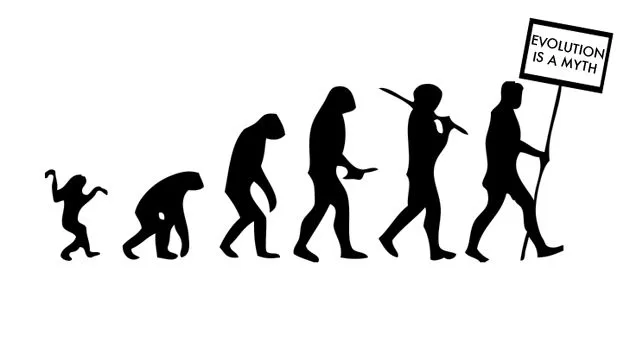Evolution is a purely naturalistic belief system about the universe, whose definition is always evolving. Though certainly not an exhaustive study, this will present the most common claims for rebuttal.
Natural selection is one of the mechanisms of evolution.
To select is to remove a subset of what already exists and discard the rest, not create something new. This is one way in which bacteria develop resistance to antibiotics; the drugs kill off the competition from the bacteria that already had immunity.
Mutation is another mechanism of evolution.
Mutation removes functionality, which is another way that some bacteria develop immunity to antibiotics. They are devolving, like everything else. The fruit fly experiment ended in failure; deliberate, multi-generational mutation only produced bizarre fruit flies— never horseflies, houseflies, or dragonflies, much less horses, houses, or dragons. So mutation, like selection, is an enemy of evolution.
Consider also the problem of getting mutated characteristics into the gametes where they can be passed on. No learned skill can be encoded in them, and the mutation will not be passed on unless a mate with the same mutation is found, they produce viable offspring, and the offspring marry each other to keep the mutation going. The odds of favorable mutations that don’t render the offspring sterile are extremely small, but they get orders of magnitude smaller when applied to developing gills into lungs for example. So much blind faith is required at every step along the way— and on a path that unguided processes cannot follow.
Given enough time, anything can happen.
So time can turn frogs into princes? This is magic, not science. Statistically, an unguided process always results in no net gain; it winds up in equilibrium. This is illustrated by the famous coin-flipping experiment: The more trials you have, the closer you get to equilibrium. So time is yet another enemy of evolution: the more time passes, the closer we get to no evolution at all. Therefore, if the universe is billions of years old, we should all be back to pond scum by now.
Three claims so far— natural selection, mutation, and time— and all three work against evolution.
Evolution is only concerned with change over time, not origins.
Evolution must believe in matter from non-matter and life from non-life; it has no choice. And it is hypocritical for evolutionists to insist that creationists explain where God came from, while they exempt themselves from explaining where the first life or the singularity came from. If someone cannot explain the beginning, they have no right to claim absolute knowledge of what happened since then in pre-history.
There is likely to be life everywhere in the universe. This proves that regardless of the odds, life does arise from non-life quite often.
First, this has only been predicted, not observed. Second, the more life is found on other planets, the more absurd the theory of abiogenesis becomes, since the odds of it happening even once are very slim. This again is a belief in magic and miracles that disregards observation and probability. How can belief in an intelligent Designer be less rational?
Science will eventually have all the answers.
Time to the rescue again? The more science discovers, the less likely it becomes that answers about origins or alleged evolution will come. The smallest living cells, once thought to be simple and primitive, are now known to be incredibly complex biological factories of ingenious design. But this is blind faith in naturalism, and if evolutionists can have faith then so can creationists. We know through archeology that history has not been a steady climb from ignorance and simplicity to knowledge and complexity; there were ancient civilizations whose technology still surpasses our own.
The present is the key to the past.
As just explained in the previous point, the past has been very different from the present, and this is not a scientific statement anyway. Science can only examine the present; forensics or legal evidence is required in order to examine the past. Evolution also fails to face the insurmountable odds of symbiotic evolution such as flowers and bees; to think that these interdependencies evolved in perfect synchrony over millions of years is at least as absurd as anything proposed by creationists.
Design is only an illusion, something we presume because we are designers.
How can people look at a jet engine and say “Design!” but look at its designers and say “Accident!”? This is utter denial; it ignores evidence of design based upon the designer. How did evolutionists ever expect to use SETI to detect an intelligent signal from space, when they refuse to define “intelligent”? The laws of physics/nature are designs of their own; which came first, the laws or the matter they act upon? Evolution does not have, never can have, and flatly refuses to have, an answer. It cannot account for information coding, which requires a sender and receiver who both know the code.
Naturalism is unbiased and therefore superior to supernaturalism.
Naturalism is anti-science because it limits the interpretation of data and presumes outcomes before the experiment has begun. Take the dating of ancient artifacts or life for example; evolution must first presume the scale (very long periods of time, the magic wand) and then discard or adjust any anomalies in measurement which were unwanted or unexpected. Yet even a child knows that you don’t measure oven temperature with a body thermometer; the scale is way off, in spite of both being thermometers. But when the scale is unknown, a truly scientific approach would be to use a wide variety of scales. One must presume long ages before choosing a long-age scale. And if it is objected that certain decaying properties tell us the scale, the response is that all such techniques begin with assumptions, not observations.
Conclusion
We’re all still waiting for someone to explain how numerous co-dependencies (e.g. flowers and bees) all evolved in perfect synchronization for millions of years without fail. Or how selection creates new information, when to select means to take a subset of what already exists. Or how an unguided process can ever have a net gain in any direction; statistically, it’s no different from flipping a coin, which shows that the greater the number of trials, the closer we come to no net gain in either direction. Or how learned skills can be encoded into the gametes in at least one male and one female so the next generation inherits it. Or how mutation can account for evolution when every experiment has failed to even begin to turn one organism into another; e.g. the fruit fly experiment, which only ever produced mutated fruit flies rather than house flies, horse flies, or dragon flies.
As with its partner atheism, evolution is a blind faith, and it exempts itself from scrutiny on questions it cannot answer (e.g. abiogenesis). It is also an unfalsifiable theory since no discovery is ever deemed sufficient to debunk it; instead, the theory simply evolves and is thus unscientific. Despite the discovery of viable blood cells in the bones of dinosaurs, despite the discovery of “primitive” animals such as the Coelacanth alive today, despite the the discovery of the amazing complexity of life at its most basic level, the theory itself is clung to like a security blanket. Peer review and universities are controlled and guarded by evolutionists. Even some of their own proponents now admit that true scientific discovery has been hijacked by a religious scientism, much like the prevailing view of the scientific community with whom the Roman Catholic Church sided against Galileo.







